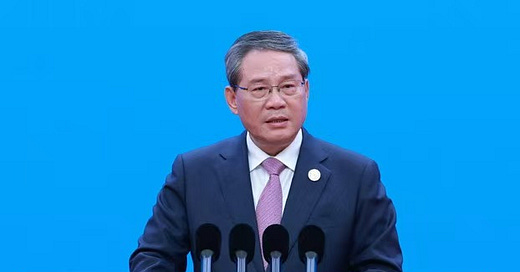Chinese Premier reaffirms confidence of achieving annual GDP growth target
All eyes on China's top legislature's review of State Council's debt swap plan
Good afternoon! Some say this week might be the most pivotal of the year as it sees not only the U.S. election but also China’s top legislative body's review of a significant bill proposed by the State Council about raising ceilings on local government debt to replace existing hidden debts, a key part of a series of stimulus measures.
China's top legislature starts standing committee session -- Xinhua
Lawmakers also reviewed a State Council bill on raising ceilings on local government debt to replace existing hidden debts, several reports on handling proposals submitted by lawmakers, a deputy qualification report, and personnel-related bills, among others.
Chinese Premier Li Qiang recently reaffirmed China’s confidence in achieving its annual economic growth targets. His affirmation came during a speech at the 7th China International Import Expo (CIIE) on Nov. 5, a major project consistently promoted by the Chinese government in recent years.
This is the context in which Premier Li mentioned confidence in achieving this year's economic growth targets during his speech at CIIE:
我们面对经济下行压力,我们有条件加大逆周期调节力度,财政政策、货币政策等都有比较大的空间,政策工具也更加丰富,宏观调控的精准度、有效性不断的增强。同时我们注重调动各方面的积极性,不断的激发经济的内生动力。因此无论是对今年目标的实现,还是对今后一个时期中国经济的发展,我们都是充满信心的。
In the face of downward economic pressure, we are poised to strengthen counter-cyclical adjustments. There is considerable room to be tapped into in fiscal and monetary policies, and the range of policy tools has become more diverse. The precision and effectiveness of macroeconomic regulation continue to improve. Meanwhile, we laid great emphasis on motivating various sectors and continuously strengthening the internal driving force of the economy. Therefore, we remain fully confident not only in achieving this year's targets but also in the long-term development of China's economy.
China's economy grew by 4.8% in the first three quarters of the year, which aligns with the target GDP growth rate of “5%左右” around 5% set at the beginning of the year. The government has introduced a package of economic stimulus policies starting at the end of September. A notable meeting of the Political Bureau of the Communist Party of China (CPC) Central Committee on Sept. 26, referred to simply as “9.26,” has become a significant milestone.
The Standing Committee of the 14th National People's Congress (NPC), China's top legislature, started its 12th session Monday in Beijing and is expected to conclude on Friday afternoon. As you may recall, during the Ministry of Finance press conference on Oct. 12, when some asked about the specifics of the debt swap plan, Minister Lan Fo'an responded that the debt restructuring needed to follow legal procedures, referring specifically to the NPC Standing Committee session that started this week.
Recently, I've had discussions with some domestic investors and economic observers, and I could sense a strong interest not only in the scale of debt restructuring but also in how the funds released to local governments will be used for public welfare investments. Additionally, there is significant market attention on how the central government ensures that local governments effectively implement the policies.
Therefore, I believe that it is essential for the Ministry of Finance to make clear statements on certain occasions. For instance, according to Cailian Press:
财政部在不同场合强调,督促地方政府严肃财经纪律、强化预算约束、划清政企权责,严禁地方政府通过国有企事业单位违规举债建设政府投资项目,严禁举债建设楼堂馆所、形象工程。持续保持高压监管态势,发挥部门协同监管合力,严格落实地方政府举债终身问责制和债务问题倒查机制,对新增隐性债务和不实化债等行为,发现一起、查处一起、问责一起。
The Ministry of Finance has repeatedly emphasized on various occasions the need for local governments to adhere strictly to financial discipline and budget constraints, clearly delineate the responsibilities between government and enterprises, and strictly prohibit local governments from financing debt through state-owned enterprises to fund government investment projects or constructing grand buildings and vanity projects. The ministry advocates maintaining a high-pressure regulatory stance, leveraging collaborative supervision among departments, and strictly implementing a lifelong accountability system for local government borrowing and a backward tracing mechanism for debt issues. This includes discovering, investigating, and holding accountable each instance of new hidden debt and false debt restructuring.
Regarding the current challenges and solutions for China's economy, I think Zhang Bin, the Deputy Director of the Institute of World Economics and Politics at the Chinese Academy of Social Sciences, spoke very clearly about it in a recent interview with China Daily.
他认为,从目前情形看,我国需要把逆周期政策的力度进一步加大。“克服总需求(不足)的情况其实像一场赛跑。要走出需求不足,政策要走在市场的前面,才能够打破预期,然后才能够扭转预期,进入到一个良性的循环里面。”
......
张斌称,逆周期政策最终的落脚点是提高全社会的收入水平。据他测算,三季度消费倾向(人均消费支出/人均可支配收入)已经上升至约67%,几乎恢复到疫情前的水平。这意味着,在收入不变的情况下进一步扩大消费,空间已经非常有限,进一步扩大消费要靠提高收入,而提高收入要靠扩大支出。
“带动消费不是说光是激发消费意愿、创造消费场景就行了。更重要的是提高我们的收入,而提高收入,跟中央政治局会议、四部委的(发布)会、逆周期政策是紧密联系在一块的,因为逆周期政策最终落在地上是要提高收入。”
He believes that, given the current situation, our country needs to further intensify counter-cyclical policies. "Overcoming the situation of insufficient total demand is like a race. To get past this insufficiency, policies need to exceed market expectations, entering into a virtuous cycle."
Zhang Bin stated that the ultimate goal of counter-cyclical policies is to raise the overall income level of society. According to his calculations, the propensity to consume in the third quarter (average consumer spending/average disposable income) has risen to about 67%, nearly returning to pre-pandemic levels. This means that with incomes remaining constant, the room to further expand consumption is very limited; increasing consumption further depends on raising incomes, and that requires increasing expenditures.
"Driving consumption is not just about stimulating the desire to consume or creating scenarios for consumption. More importantly, it involves increasing our income, which is closely linked to meetings of the Central Politburo, joint announcements by various ministries, and counter-cyclical policies because the practical implementation of these policies ultimately aims to increase income."
Moreover, I invited You Zhixin, a reporter from Xinhua's Shanghai bureau who covered this and the previous six years of CIIE, to share her insights on the event:
Since 2018, the U.S. has imposed several rounds of import tariff increases on China, a move that has been widely noted. However, perhaps not as many have noticed that in the same year, the China International Import Expo (CIIE) was launched. Every year since then, from November 5th to 10th, the CIIE, the world's first national-level exposition dedicated to imports, is held in Shanghai.
As a reporter who has covered the CIIE for seven consecutive years, I have interviewed dozens of newcomers and frequent attendees, participated in several forums, and witnessed how the CIIE strives to expand its global influence, aiming to become a catalyst for win-win cooperation worldwide and to offer international public goods and services that benefit the world, against the backdrop of varying global political and economic climates.
CIIE is an invaluable platform for companies seeking new partnerships.
Per Linden, Founder of the Nordic Hub Trade Association, has participated since the first year of the CIIE with a small booth. At the event, he met more suppliers and business partners, which drove his decision to set up the Nordic Hub, a permanent showroom of products from SMEs from Nordic countries in Shanghai. I think his story reflects the spirit of the CIIE, what is encouraging entrepreneurs to go there, find new ideas, and new partners for their next growth phase in China.
Against the backdrop of the auto trade conflict between China and Europe and the U.S., however, many major global auto companies are showcasing their latest innovative and environmentally friendly products this year, reaffirming their commitment to the world's largest vehicle market. At the same time, building on the success of last year, AmCham Shanghai and the United States Department of Agriculture partner again to launch the American Food & Agriculture Pavilion, promoting U.S. food and agricultural products at the venue. Obviously, their significant presence in China is imperative, since the country is an indispensable destination for trade and investment.









